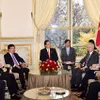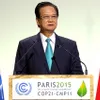UK offers administrative reform advice
Developing new regulatory reform models and applying information technology to administrative reform were the main content of a workshop sharing UK experience on the issue.
The workshop was part of the framework of strategic cooperation agreement between Vietnam and the UK on creating favourable business environment for British enterprises in Vietnam. According to experts, administrative reform in Vietnam has seen several significant achievements. Specifically, 4,500 procedures have been simplified. However, challenges still remain.
"Many administrative procedures are still carried out manually. The public have to come directly to administrative agencies. Also, several agencies have been extraordinarily inefficient in applying the reforms", said Ngo Hai Phan, Director, Department of Administrative Procedures Control.
At the workshop, experts from the UK shared experiences in applying new models during administration reform. One of them is “one in, two out” rule applied in the country since 2012. The rule indicates that for every pound of costs imposed on businesses through a new regulation, two pounds of costs must be removed through deregulation. With this rule, businesses in UK have reduced costs incurred through regulations by 2.2 billion pounds every year.
Besides the “one in, two out” rule, British experts shared about a regulators’ code. According to this code, regulators must regard their regulatory activities based on the needs of and viewpoints of businesses. In addition, experts at the workshop stressed that information technology such as e-government offered a solution to fostering administrative reform.
In order to develop e-government and improve the operation of governmental agencies during administrative reform, electronic systems have been implemented for data management. By 2020, the system will be implemented in all provinces and district agencies and in 60% of communal units.
Tags:





